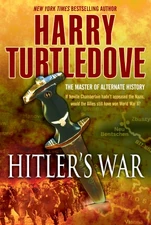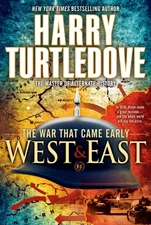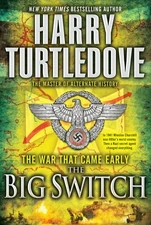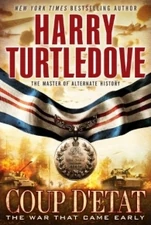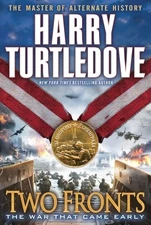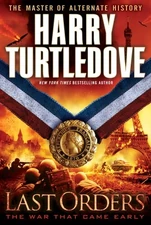TR (Message Wall | contribs) (Adding categories) |
TR (Message Wall | contribs) No edit summary |
||
| Line 13: | Line 13: | ||
| family = |
| family = |
||
| affiliations =Spanish Army}}{{Clearright}}{{The War That Came Early Historical Character |
| affiliations =Spanish Army}}{{Clearright}}{{The War That Came Early Historical Character |
||
| − | |appearance = ''[[Hitler's War]]''<br>through<br>''[[ |
+ | |appearance = ''[[Hitler's War]]''<br>through<br>''[[Last Orders]]'' |
| + | |type of appearance = Direct|death = 1943 |
||
| − | | |
+ | |cause of death = Shot by an anti-tank gun}}{{Stack end}}'''José Sanjurjo y Sacanell, 1st Marquess of the Rif''' (1872–1936) was a [[Spanish]] Army General officer who was one of the chief conspirators in the military uprising that led to the [[Spanish Civil War]]. Sanjurjo did not see the war to completion, as he was killed in a plane crash in July 20, 1936. |
==José Sanjurjo in [[The War That Came Early]]== |
==José Sanjurjo in [[The War That Came Early]]== |
||
| − | '''José Sanjurjo''' was the leader of the [[Spanish Nationalists (The War That Came Early)|Nationalist]] faction of the [[Spanish Civil War (The War That Came Early)|Spanish Civil War]]. He maintained political ties with [[Germany (The War That Came Early)|Germany]] and [[Italy (The War That Came Early)|Italy]], both of which provided aid in the form of men and arms. In turn, Sanjurjo supported German Chancellor [[Adolf Hitler (The War That Came Early)|Adolf Hitler's]] claims in [[Czechoslovakia (The War That Came Early)|Czechoslovakia]], bringing Spain into the [[World War II (The War That Came Early)|Second World War]]. |
+ | '''José Sanjurjo''' (1872-1943) was the leader of the [[Spanish Nationalists (The War That Came Early)|Nationalist]] faction of the [[Spanish Civil War (The War That Came Early)|Spanish Civil War]]. He maintained political ties with [[Germany (The War That Came Early)|Germany]] and [[Italy (The War That Came Early)|Italy]], both of which provided aid in the form of men and arms. In turn, Sanjurjo supported German Chancellor [[Adolf Hitler (The War That Came Early)|Adolf Hitler's]] claims in [[Czechoslovakia (The War That Came Early)|Czechoslovakia]], bringing Spain into the [[World War II (The War That Came Early)|Second World War]]. |
Sanjurjo was in exile in [[Portugal (The War That Came Early)|Portugal]] in 1936 when the Spanish Civil War broke out. Sanjurjo immediately flew to [[Burgos]], Spain in a small two-seater plane. Sanjurjo, a vainglorious man, had been determined to bring his entire wardrobe with him. However, the pilot, Major [[Juan Antonio Ansaldo#Juan Antonio Ansaldo in The War That Came Early|Juan Antonio Ansaldo]], feared that the weight of the wardrobe would put them (and by extension, the Nationalist cause) at unnecessary risk. Ansaldo appealed to Sanjurjo's vanity, reminding him how important he was to the cause. Sanjurjo relented, and left his wardrobe behind. The plane safely arrived in Burgos, and Sanjurjo immediately took control of the Nationalist forces.<ref>''[[Hitler's War]]'', pgs. 3-7.</ref> |
Sanjurjo was in exile in [[Portugal (The War That Came Early)|Portugal]] in 1936 when the Spanish Civil War broke out. Sanjurjo immediately flew to [[Burgos]], Spain in a small two-seater plane. Sanjurjo, a vainglorious man, had been determined to bring his entire wardrobe with him. However, the pilot, Major [[Juan Antonio Ansaldo#Juan Antonio Ansaldo in The War That Came Early|Juan Antonio Ansaldo]], feared that the weight of the wardrobe would put them (and by extension, the Nationalist cause) at unnecessary risk. Ansaldo appealed to Sanjurjo's vanity, reminding him how important he was to the cause. Sanjurjo relented, and left his wardrobe behind. The plane safely arrived in Burgos, and Sanjurjo immediately took control of the Nationalist forces.<ref>''[[Hitler's War]]'', pgs. 3-7.</ref> |
||
| Line 33: | Line 34: | ||
As fighting dragged on into 1941, the Spanish Civil War was once again a stalemate. Gradually, things began to turn against the Nationalists through 1941. The British military launched a [[1941 British Military Coup|coup]] that deposed the appeasement-minded government of [[Horace Wilson (The War That Came Early)|Horace Wilson]] in the spring.<ref>''[[Coup d'Etat]]'', pgs. 151-152.</ref> Britain promptly withdrew from the Soviet Union, and began bombing German territory while fighting Italy in [[North Africa (The War That Came Early)|North Africa]]. While France continued its alliance with Germany for the time being, the French government also began supplying weapons to the Republic.<ref>Ibid., pgs. 205-206.</ref> And in December, Czech sniper [[Vaclav Jezek]] killed [[Francisco Franco (The War That Came Early)|Francisco Franco]], one of Sanjurjo's most talented generals.<ref>Ibid., pg. pgs. 408-409.</ref> |
As fighting dragged on into 1941, the Spanish Civil War was once again a stalemate. Gradually, things began to turn against the Nationalists through 1941. The British military launched a [[1941 British Military Coup|coup]] that deposed the appeasement-minded government of [[Horace Wilson (The War That Came Early)|Horace Wilson]] in the spring.<ref>''[[Coup d'Etat]]'', pgs. 151-152.</ref> Britain promptly withdrew from the Soviet Union, and began bombing German territory while fighting Italy in [[North Africa (The War That Came Early)|North Africa]]. While France continued its alliance with Germany for the time being, the French government also began supplying weapons to the Republic.<ref>Ibid., pgs. 205-206.</ref> And in December, Czech sniper [[Vaclav Jezek]] killed [[Francisco Franco (The War That Came Early)|Francisco Franco]], one of Sanjurjo's most talented generals.<ref>Ibid., pg. pgs. 408-409.</ref> |
||
| − | The Nationalists managed to hold their positions throughout 1942 and into early 1943. Vaclav Jezek actively pursued Sanjurjo, but for the longest time, Sanjurjo didn't oblige him.<ref>''[[Two Fronts]]'', generally.</ref> |
+ | The Nationalists managed to hold their positions throughout 1942 and into early 1943. Vaclav Jezek actively pursued Sanjurjo, but for the longest time, Sanjurjo didn't oblige him.<ref>''[[Two Fronts]]'', generally.</ref> Finally, on a rainy day in the Fall of 1943, Sanjurjo visited the front, and Jezek shot him dead.<ref>''[[Last Orders]]'', pg. 144-146.</ref> |
| − | {{Ongoing Series}} |
||
==References== |
==References== |
||
| Line 51: | Line 51: | ||
[[Category:1870s Births (OTL)]] |
[[Category:1870s Births (OTL)]] |
||
[[Category:1930s Deaths (OTL)]] |
[[Category:1930s Deaths (OTL)]] |
||
| + | [[Category:1940s Deaths (Fictional Work)]] |
||
[[Category:Aviation Accident Deaths (OTL)]] |
[[Category:Aviation Accident Deaths (OTL)]] |
||
| + | [[Category:Deaths by Firearm (Fictional Work)]] |
||
[[Category:Fascists]] |
[[Category:Fascists]] |
||
[[Category:Generals]] |
[[Category:Generals]] |
||
| + | [[Category:Killed During World War II (Alternate Timeline)]] |
||
[[Category:Marquesses]] |
[[Category:Marquesses]] |
||
[[Category:Smokers]] |
[[Category:Smokers]] |
||
Revision as of 04:59, 23 July 2014
| ||||||||||||||||||||||||||||||
José Sanjurjo y Sacanell, 1st Marquess of the Rif (1872–1936) was a Spanish Army General officer who was one of the chief conspirators in the military uprising that led to the Spanish Civil War. Sanjurjo did not see the war to completion, as he was killed in a plane crash in July 20, 1936.
José Sanjurjo in The War That Came Early
José Sanjurjo (1872-1943) was the leader of the Nationalist faction of the Spanish Civil War. He maintained political ties with Germany and Italy, both of which provided aid in the form of men and arms. In turn, Sanjurjo supported German Chancellor Adolf Hitler's claims in Czechoslovakia, bringing Spain into the Second World War.
Sanjurjo was in exile in Portugal in 1936 when the Spanish Civil War broke out. Sanjurjo immediately flew to Burgos, Spain in a small two-seater plane. Sanjurjo, a vainglorious man, had been determined to bring his entire wardrobe with him. However, the pilot, Major Juan Antonio Ansaldo, feared that the weight of the wardrobe would put them (and by extension, the Nationalist cause) at unnecessary risk. Ansaldo appealed to Sanjurjo's vanity, reminding him how important he was to the cause. Sanjurjo relented, and left his wardrobe behind. The plane safely arrived in Burgos, and Sanjurjo immediately took control of the Nationalist forces.[1]
By 1938, Sanjurjo's forces held roughly half the country. This did not include Madrid, however. In 1936, Sanjurjo could quite easily have taken Madrid from Republican forces. However, he decided to relieve the Alcázar de Toledo, and Madrid remained Republican.[2]
Even so, the knowledge that he had Sanjurjo's support helped bolster Adolf Hitler's confidence as he made demands on the Sudeten region of Czechoslovakia.[3] When a greater European war broke out in September of 1938, Sanjurjo also declared war on Britain and France.[4] He personally led the siege of Gibraltar, with the aid of German and Italian forces, and oversaw its fall in early 1939.[5] After this, however, foreign aid to both sides dried up, as Germany and the Allies were concentrating all their efforts on the fighting in France.[6] Nonetheless, in March, 1939, Sanjurjo decided to concentrate on taking Madrid.[7]
Initially, the Nationalists gained some momentum, taking the University City District within a few weeks.[8] However, they could not get into Madrid proper. The Republicans succeeded in pushing the Nationalists out of University City by the middle of the summer.[9]
Concerned, Sanjurjo visited the front personally.[10] He spoke with various men, including Sgt. Miguel Carrasquel and Pvt. Joaquin Delgadillo. Sanjurjo asked for, and received, an honest assessment of the war effort from Carrasquel. Agreeing that there were problems, Sanjurjo moved down the line. He and his entourage briefly came under fire, but survived.[11]
Sanjurjo maintained the offensive on Madrid for the remainder of the year, and into the next, but the line outside Madrid continued to hold on into 1940.[12] Even the "big switch" of Summer of 1940 didn't particularly advantage Sanjurjo; while Britain and France now aligned with Germany and were no longer supplying the Spanish Republic, Germany was not in a position to help the Nationalists much more than they had been.[13] The Republic also gained one unexpected advantage: the arrival of a regiment of Czechoslovak troops who had been fighting in France, and refused to join the war against the Soviet Union.[14]
As fighting dragged on into 1941, the Spanish Civil War was once again a stalemate. Gradually, things began to turn against the Nationalists through 1941. The British military launched a coup that deposed the appeasement-minded government of Horace Wilson in the spring.[15] Britain promptly withdrew from the Soviet Union, and began bombing German territory while fighting Italy in North Africa. While France continued its alliance with Germany for the time being, the French government also began supplying weapons to the Republic.[16] And in December, Czech sniper Vaclav Jezek killed Francisco Franco, one of Sanjurjo's most talented generals.[17]
The Nationalists managed to hold their positions throughout 1942 and into early 1943. Vaclav Jezek actively pursued Sanjurjo, but for the longest time, Sanjurjo didn't oblige him.[18] Finally, on a rainy day in the Fall of 1943, Sanjurjo visited the front, and Jezek shot him dead.[19]
References
- ↑ Hitler's War, pgs. 3-7.
- ↑ Ibid., pg. 434.
- ↑ Ibid., pg. 8.
- ↑ Ibid., pg. 20.
- ↑ Ibid., pgs. 206-209.
- ↑ Ibid., pgs. 327-328.
- ↑ Ibid., pgs. 434-435, 441-444.
- ↑ West and East, pg. 50.
- ↑ Ibid., pg. 176.
- ↑ Ibid., pg. 187.
- ↑ Ibid., pgs. 188-191.
- ↑ The Big Switch, pg. 155.
- ↑ Ibid., pg. 245.
- ↑ Ibid., pg. 352.
- ↑ Coup d'Etat, pgs. 151-152.
- ↑ Ibid., pgs. 205-206.
- ↑ Ibid., pg. pgs. 408-409.
- ↑ Two Fronts, generally.
- ↑ Last Orders, pg. 144-146.
| Military offices (The War That Came Early) | ||
|---|---|---|
| Preceded by Office created |
Commander of the Spanish Nationalists July, 1936 to Present |
Succeeded by Incumbent as of most recent volume |
| ||||||||||||||||||||||

